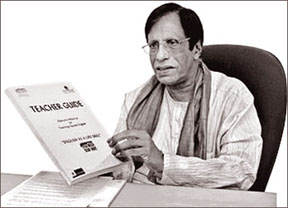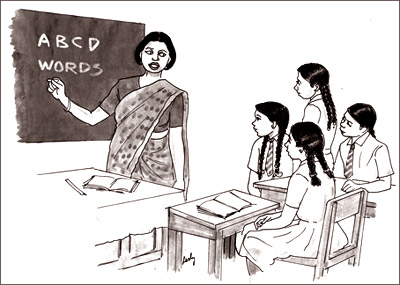|
 Success due to Bottom-up planning: Success due to Bottom-up planning:
Evolving homegrown English model
Rasika Somarathna
The national road map to take communicative
English skills across the country, the Presidential initiative -
‘English as a life skill’ was launched in June 2009. The program aims at
the dis-empowerment of English as a privilege of the elites to be
completed and instead to see the empowerment of a new ideology of
English as a life skill. In an interview with the Daily News Coordinator
of Presidential Task Force on ‘English as a life skill’ Sunimal Fernando
outlines the novel approach taken to promote spoken English skills, its
aims, progress and the future plans First part of this article was
published on December 14
Q: In your opinion, why this radical decision to devolve
maximum responsibility to grass root stakeholders produce desired
results?
A: Our earlier attempts failed mainly due to the English
education system evolving on strategies based on foreign models. Also
our education planners did not consult grass root stakeholders when
preparing relevant material. Thus the content produced did not meet the
needs of the majority of students in this country. The material they
were given to use was alien to both teachers and students.
I personally think that the curriculum we have adopted for English
over the years is far too advanced for the average rural child. This is
due to the fact that grass roots not being consulted while preparing
such curriculum.
They were also not concerned about its impact on the ultimate
beneficiary of their exercise, in this case the child. What they did was
to put forward a list of quantifiable activities to appease the Accounts
Department. There is no doubt that the money must be accounted for, but
the main purpose of your exercise should be the impact of your efforts
on the child. This is the approach we took. In line we encouraged the
academia and planners to give what the grass roots wanted. The Master
Trainers with the assistance of academia developed new teaching
techniques and material which were specific to Sri Lanka.
Also we have taken a decision to make any intellectual material
developed through public funds to be made public property. They would be
made available on the Internet and other relevant communication modes.
We always went for a joint approach, a bottom-up approach.
I think this could be food for thought not only to the school system
in our country but to the public sector as a whole. I think a joint
approach on all matters could pay rich dividends and supplement growth
in all fronts.
Q: Could you tell us how the national initiative ‘English as a
Life Skill’ came about?
A: President Mahinda Rajapaksa wanted the dis-empowerment of
English as a privilege of the elites to be completed and instead to see
the empowerment of a new ideology of English as a life skill. He wanted
English to be a straight and simple tool of communication stripped of
its historical baggage, a skill for employment and a vehicle for
reaching the outside world of knowledge. He wanted English transformed
into a common property, a resource owned by all.
With this vision in mind, the President in 2008 asked me if I would
take over the task of driving a national initiative to give expression
to a pledge he made in the Mahinda Chintana, to take Spoken English
language skills across the country.
He told me to identify the reasons behind our former failures and
prepare a homegrown model to suit our needs.
I first went to the people who mattered most, the teachers in
villages who taught English to schoolchildren. I with the help of others
had friendly informal discussions with teachers, all round the country.
After engaging in this exercise from November 2008 to April 2009, we
felt that we had sufficient knowledge and material to work out the
framework of a homegrown model.
On the advice of the President, a Presidential Task Force was created
to spearhead the initiative, ‘English as a Life Skill’ in which I was
the coordinator. Later we developed the road map which was launched on
June 24, 2009. A strong national cadre of 80 Master Trainers trained at
the English and Foreign Languages University (EFLU) in Hyderabad was
established, with 320 assistant trainers to help them.
 In the spirit of the President, we learnt from the people. As a
result, it was grounded on Sri Lankan experience with contributions
coming mainly from the English teacher community of this country. The
concept ‘English as a Life Skill’ was crafted by the Secretary to the
President Lalith Weeratunge. Throughout, Secretary Weeratunge was a
tower of strength to the initiative which has been hailed as an all
round success in the short span of its implementation. In the spirit of the President, we learnt from the people. As a
result, it was grounded on Sri Lankan experience with contributions
coming mainly from the English teacher community of this country. The
concept ‘English as a Life Skill’ was crafted by the Secretary to the
President Lalith Weeratunge. Throughout, Secretary Weeratunge was a
tower of strength to the initiative which has been hailed as an all
round success in the short span of its implementation.
Q: What were the main lessons learnt and steps taken to
rectify identified anomalies?
A: We started using various methods to alleviate this fear
psychosis. One was a huge national campaign to encourage speaking
English our way. Any language has a spoken or informal variety and a
formal or written variety. The informal variety is the focal variety
that is the variety to which your emotion, experience, all related to
your environment and culture, can be expressed. So in the standard
British English you cannot express the emotion that you derive from your
local environment. For example the emotion when saying that is a Jak
tree is different when saying that is a kos tree.
So to innovate we have to borrow words from our own language. It is
to be precise is to make a Parabasa a Swabasa. English is a Parabasa and
our intention is to indigenize it by making it a Swabasa. For this
purpose we have to allow grammar innovations. Sri Lankan English is
essentially an informal or spoken variety. The written variety comes as
international Standard English. International Standard English is an
evolving one.
At the moment it is a fair mix of standard British English with US
English as well as Indian English. Our policy is that a person should
first be able to speak to have confidence to write. So our intention is
to rid this fear of speaking English.
For long we adopted the stupid method of forcing our children to
speak the standard British English, which is foreign to us. English is
all within us. Our job is to rid the fear factor to let it surface.
Q: Who are the major stakeholders in this exercise?
A: Education Ministry is the major force. Our job as the PTF
is to guide and support them. We work in a very cordial manner. All our
energies are directed at achieving the ultimate objective. Education
Minister Bandula Gunewardena has been a tower of strength. The decision
of the Education Ministry to establish a Presidential Program Unit too
is highly appreciated. A steering Committee too is to be established to
consolidate and facilitate the interaction between PTF, Presidential
Secretariat and the Ministry.
Also the Government of India has given us a lot of assistance. The
WB, ADB and the BoI too have assisted us. Director and Educational
Assistant Secretary Anura Dissanayake too have lent us enormous
assistance in obtaining funds.
Q: Can you elaborate on the changes and achievements to date?
A: During the period, 90 percent of the 22,500 English
teachers of the country were trained by the Education Ministry and the
nine Provincial Ministries to teach Communicative English to our
students.
Measures have been evolved to test listening and speaking skills in
English from the O/Level examination in 2012. The country’s first
comprehensive Teacher Guide for Spoken English was produced.
An apex level Sri Lanka India Centre for English Language Training
(SLICELT) with modern technology and local and Indian resource persons
was established at Peradeniya with Indian assistance. Similarly nine
Provincial Centres for English Language Training (PSLICELTs) with
state-of-the-art teaching technology, residential facilities for 80
trainees and local and Indian resource persons in each Centre has been
mooted. A teacher guide on ‘Sri Lankan English Standards’ Phonology,
Vocabulary and Syntax (including Grammar, word order and idiom). A 100
hour curriculum with teaching aids for a certificate course in basic
English for general public was developed. These are some of the
achievements.
Q: What are the major activities proposed for implementation
in 2011?
A: Completing the training of English teachers, further
training of relevant resource personnel, administering the 100 hour
basic English course to 9,500 school principals in the country,
educational officials at all levels, establishing nine Provincial
centres of English, two mass media campaigns, are some of the programs.
Q: What are your thoughts on the impact of the program on a
long term- basis?
A: With the progress of the initiative I have no doubt that a
national level attitudinal change and commitment to speaking English the
Sri Lankan way would be established. A new cadre of skilled rural based
English teachers to confidently take over the country’s English teaching
enterprise.
The emergence of new teaching tools and material would be another
benefit. Self-confidence, belief and the determination to use English
would improve significantly.
Language based social anomalies would be alleviated. All these facts
combined would be a catalyst to the country’s economic and social
development. Finally one day English teachers might lose their jobs (in
a lighter vain).
Concluded
|



